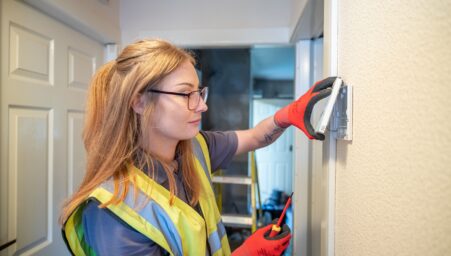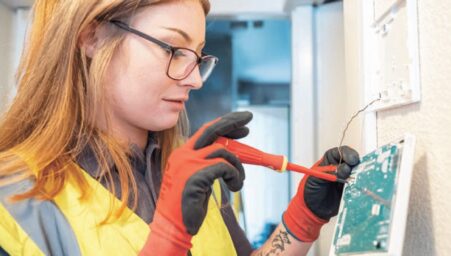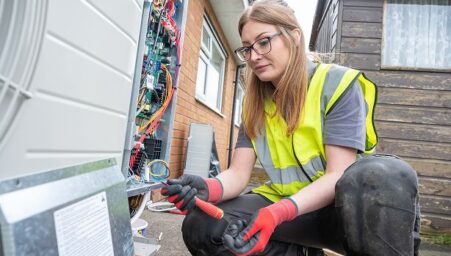Electrician
Overview
Electricians play a crucial role in powering homes, businesses, and industries by installing, maintaining, and repairing electrical systems. Their work ensures that buildings are safe and fully operational. Whether working with traditional electrical systems, renewable energy technologies, or fibre-optic systems, electricians are in high demand. This career offers stability, variety, and excellent job prospects for those entering the field and is accessible to everyone, regardless of age or background.
More about Electricians
What Do Electricians Do?
As an electrician, you will ensure the safety and functionality of electrical systems in buildings. This involves:
- Inspecting and testing electrical systems to ensure safety
- Installing wiring, light fittings, and sockets
- Fixing electrical faults or replacing parts
- Installing smart systems for lighting, heating, and security
- Working with high-tech systems like fibre optics and renewable energy sources (e.g., solar panels)
- Installing and maintaining electrical motors, transformers, and machinery
- Responding to emergency callouts such as power cuts
- Following technical plans and adhering to strict safety regulations
What Skills Will You Use?
To succeed as an electrician, you’ll need both technical and personal skills. A solid understanding of electrical systems, engineering science, and technology is essential. You must also have excellent problem-solving skills to diagnose and repair faults effectively. Attention to detail is vital, ensuring all installations and repairs are safe and compliant with regulations. Strong math and analytical skills will help with wiring, circuit design, and troubleshooting. Communication skills are crucial for working with clients, colleagues, and customers, while the ability to work well with your hands and use tools efficiently is fundamental to the job.
Where Can This Job Take You?
As you gain experience, you could move into supervisory roles, such as site supervisor or electrical project manager. You could also explore roles in electrical project design, estimating, and contract management. Some electricians move into green energy roles, like solar panel installation or electric vehicle charging points or starting your own business. Experienced electricians can also consider teaching, training apprentices, or working in electrical product design and innovation.
How to Become an Electrician?
Whether you’re just finishing school or are considering a career change, there are several routes to get started:
- College Courses: A Level 2 or Level 3 Diploma in Electrical Installation, Electronic and Electrical Engineering, or a T Level in Building Services Engineering for Construction. This provides you with the necessary technical knowledge, though hands-on training is still required to become qualified.
- Apprenticeships: Apprenticeships are a great way to learn while you work. You’ll gain hands-on experience, earn a wage, and receive training from a college or provider. You can complete a Level 3 Advanced Apprenticeship in Electrical Installation or Domestic Electrician apprenticeship.
- Work Experience: If you have some practical experience, you might be able to gain recognition for your skills through an Experienced Worker Assessment and work towards a Level 3 NVQ Diploma.
Qualifications You’ll Need
While many employers value enthusiasm and a willingness to learn, the typical qualifications you may need include:

College courses:
4-5 GCSEs at grades 9 to 4 (A* to C), including English and Maths.

Apprenticeships:
For a Level 2 apprenticeship, some GCSEs (usually including English and maths) may be required. For an advanced apprenticeship, you might need 5 GCSEs at grades 9–4 (A*–C) or equivalent. However, not all employers require formal qualifications.

Construction Skills Certification Scheme
You may also need a CSCS (Construction Skills Certification Scheme) card to work on a construction site.
Professional and Industry Bodies
Joining professional organisations can help you with ongoing development, access to training resources, and industry news. Consider joining:
WaMT are dedicated to supporting women who are interested in pursuing a trade. Please contact us at support@procure-plus.com if you have any questions.
All other Trades
Joinery
Roofing
Plumbing
Painting and Decorating
Bricklaying
Want to meet other Tradeswomen?
Whether you’re considering a career change, just getting started, or already working in the trade, our dedicated Facebook groups are a place to share advice, ask questions, and chat with other women who get it.
Women and Manual Trades
Electrical
Painting and Decorating
Woodwork
Want to meet other Tradeswomen?
Whether you’re considering a career change, just getting started, or already working in the trade, our dedicated Facebook groups are a place to share advice, ask questions, and chat with other women who get it.